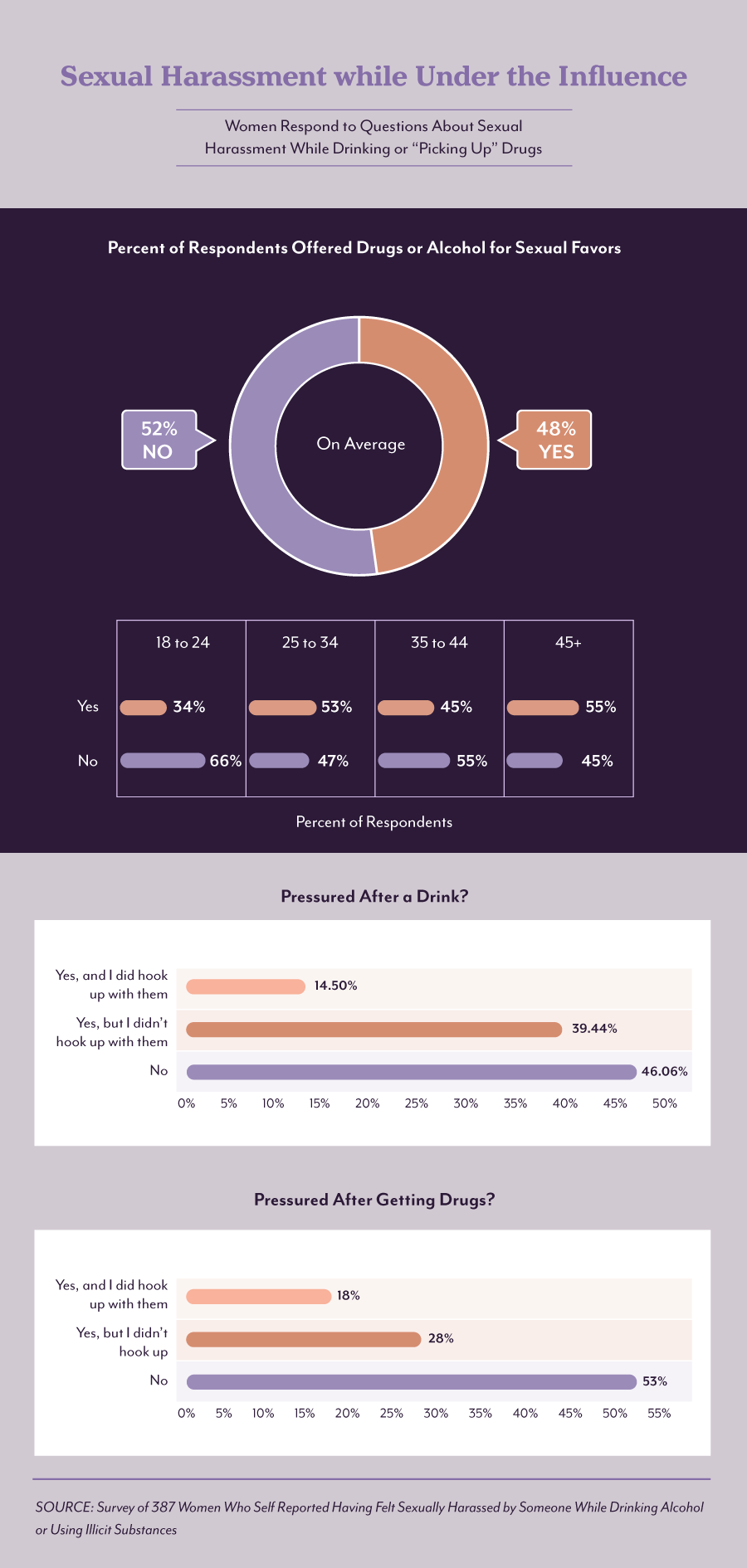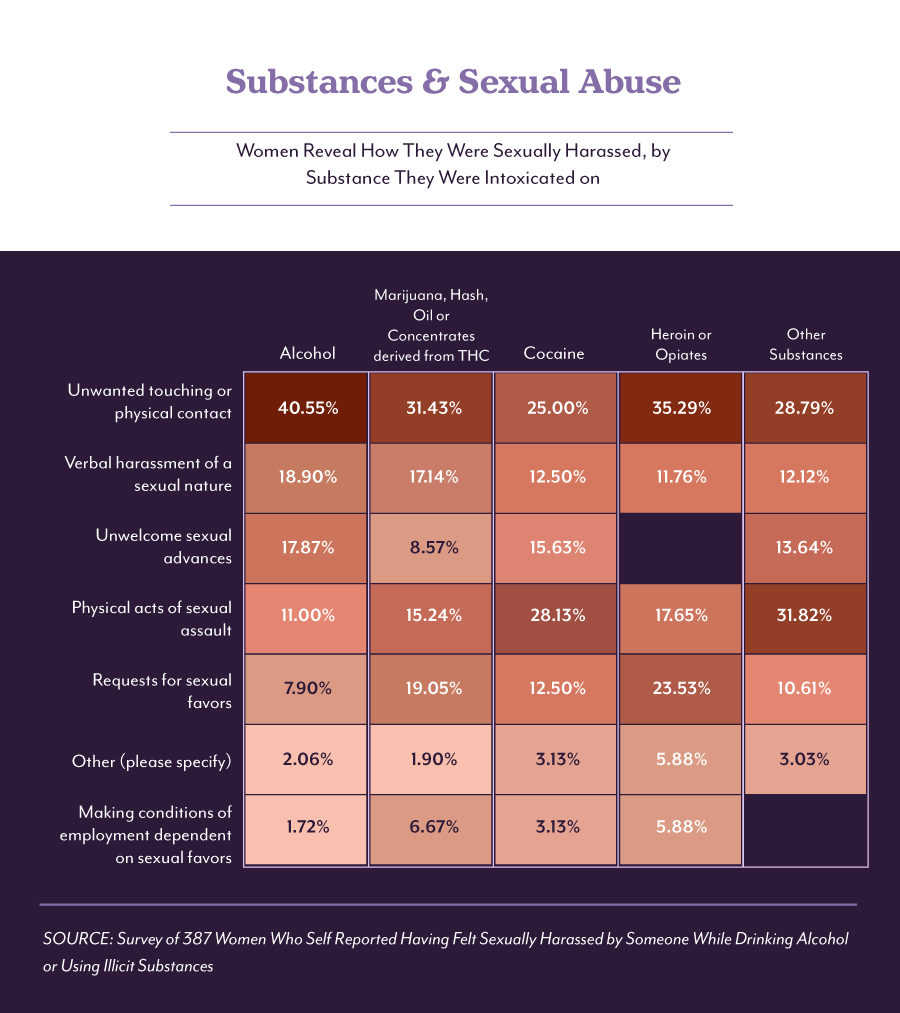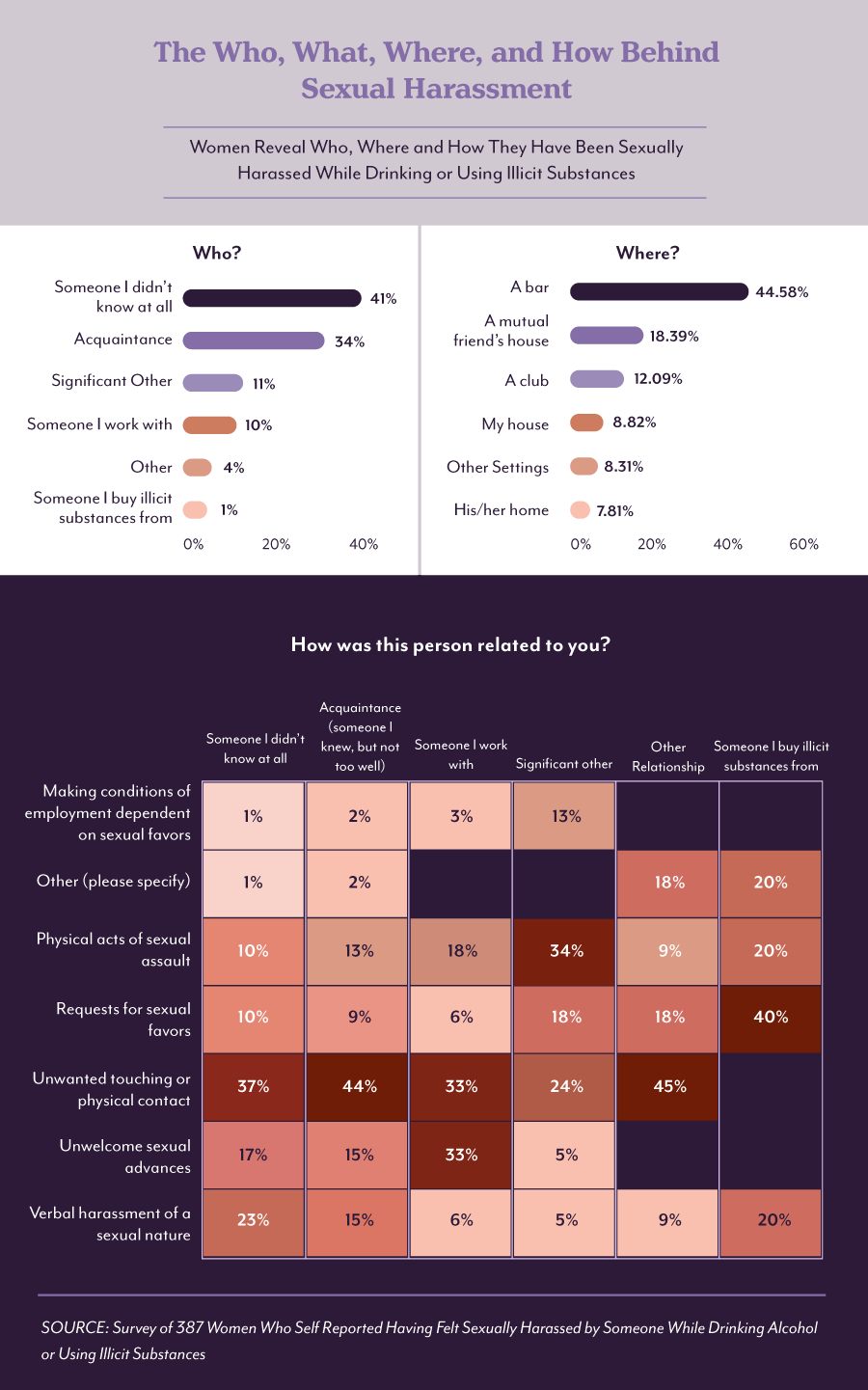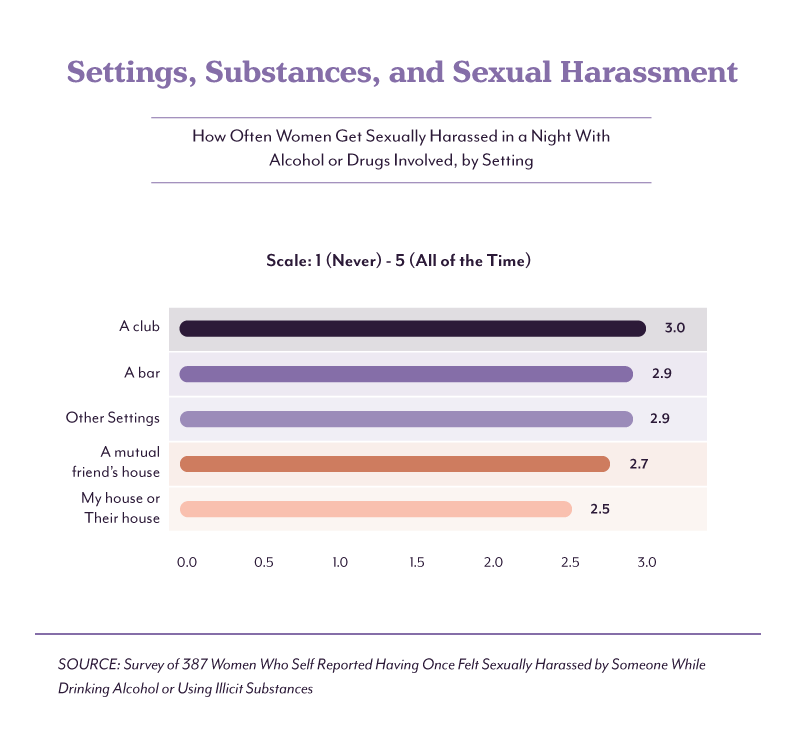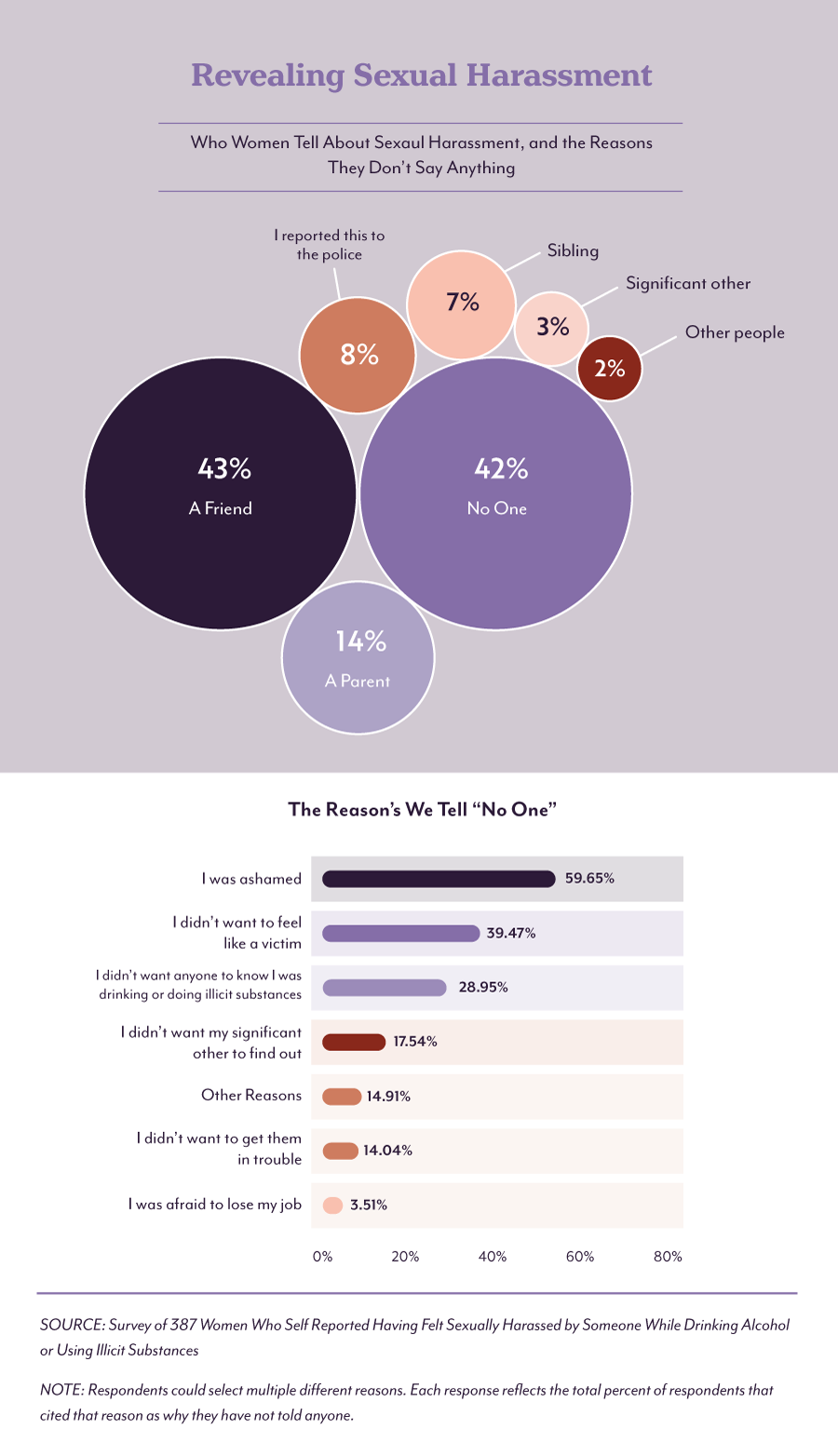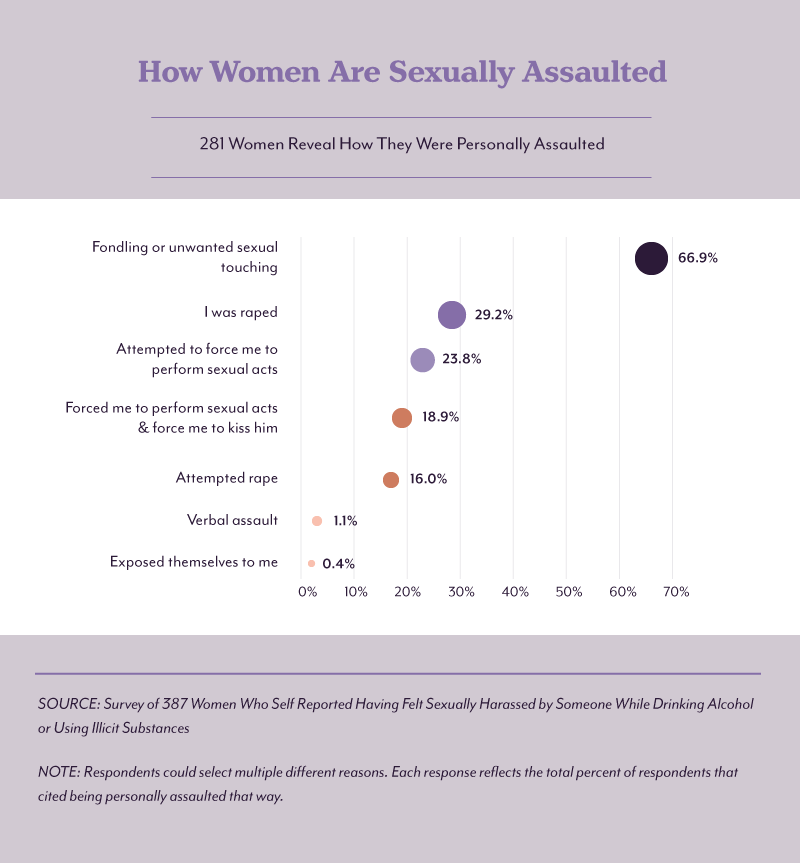
Every 98 seconds a person in the U.S. is sexually assaulted.
Across the country, the #MeToo movement has sparked a conversation around the frequency of sexual assault and harassment men and women face in America. What started as a social media hashtag for people to share their experiences has evolved into Time magazine’s 2017 “Person of the Year,” celebrating the silence breakers who’ve helped bring this national issue into the light.
But what about the role drugs and alcohol might be playing in this sexual violence? Do drugs facilitate sexual assault? To learn more, we surveyed over 380 women who told us they’d experienced sexual harassment while alcohol or illicit substances were involved. We asked them how pressured they felt after being offered a drink or drugs, who assaulted them, and who they did (or didn’t) tell about the violation – and why. Read on to learn more.
Critical Correlations
Alcohol works as both a stimulant and a depressant on the body and those effects combined can have a serious impact on how the brain processes emotions, events, and physical activities.
According to our panel of women around the country, we learned nearly half (48 percent) admitted they’d been offered drugs or alcohol for sexual favors. Typically more common among Americans between 25 and 34 and those over the age of 45, our survey revealed people of all ages are being approached to trade substances for sex.
So how often do women report feeling pressured to give in after a drink (or drugs) from men at bars, clubs, and parties? We discovered that more than 1 in 3 women felt pressured to have sex by the person who’d offered them an alcoholic beverage and resisted the advance. At the same time, nearly 15 percent said they felt pressured but ultimately gave in. Women generally felt less compelled into intimacy after being offered drugs, with 1 in 4 saying they felt pressured into having sex and 18 percent acknowledging they gave in.
Drug Facilitated Sexual Assault
Sexual predators may use a person being inhibited by date rape drugs or alcohol as a signal to make unwanted advances. Studies have shown attacks in bars typically come from men (though not exclusively) and the aggressors themselves generally aren’t intoxicated. Men who pursue these women do so because they believe they’ll be “easy targets” or less likely to refuse their advances as a result of their inebriation.
According to our survey, more than 2 in 5 women who’d been out drinking said they experienced unwanted touching of physical contact from another person. Nearly 1 in 5 said they’d experienced verbal harassment of a sexual nature. More than 1 in 10 people we surveyed who were intoxicated on alcohol at the time said they endured physical, sexual assault while under the influence.
As we learned, sexual assault was more frequent towards women who’d consumed an illicit substance. More than 1 in 4 women who responded to our survey admitted they’d been sexual assaulted while under the influence of cocaine, and nearly 1 in 3 experienced sexual assault under the influence of other substances not identified by our survey.
Trends in Sexual Harassment
Understanding the trends behind sexual harassment when the victim’s defense mechanisms may be hindered by alcohol or drug intoxication also means identifying where and how these assaults occur.
Based on more than 2 in 5 personal accounts of sexual harassment or violence, the incidents occurred at a bar and by someone, the women we surveyed didn’t know. In more than 1 in 3 cases the attacker was an acquaintance, and according to 1 in 10 women, the assault came from their significant other or a person they worked with. Combined, more than half of all assaults were committed by people the victims we polled knew in some capacity.
Research on sexual violence suggests men who commit these crimes typically start while they’re young (in high school or college) and generally assault someone they know before attacking someone they don’t. In some instances, these men will deny rape allegations while acknowledging having participated in nonconsensual sex.
More than 1 in 3 women told us they were assaulted by their significant other described physical acts of sexual assault and more than 2 in 5 relayed examples of unwanted touching or physical contact when the accused was merely an acquaintance.
Common Experiences
After having experienced sexual harassment, women often relay changes in their behavior and confidence, and that the encounter typically leaves them with feelings of stress, anxiety, and even depression. Despite these traumatic consequences, the reality is sexual harassment may be far more common towards women identified by sexual predators as less likely to defend themselves than you might expect.
Women who told us they either consumed alcohol or drugs (with no mention of volume or intoxication) rated the frequency of harassment they typically experienced based on their location. We learned women who were harassed at clubs reported the highest prevalence of unwanted sexual encounters, rating their experiences a 3 out of 5 on our scale. They also acknowledged a similar amount of harassment at bars or in other settings and even ranked their own homes (or the perpetrators) at a 2.5 out of 5.
Deciphering The Silence
Whether it’s a response to verbal harassment, unwanted advances, or physical assault, there are reasons why women don’t report inappropriate sexual behavior from people they may know professionally, personally, or intimately. In some cases, fighting back may result in retaliation that means losing the income their families need, promotions into new roles, or general shame and embarrassment. In most cases, women simply don’t feel safe opening up about the sexual harassment and assault they experience from men.
More than 2 in 5 women admitted to telling no one at all about the harassment they experienced while under the influence of drugs or alcohol. Of those women, more than half acknowledged they kept the altercation to themselves because they were ashamed by what had been done or said to them. Another 1 in 3 were afraid of feeling like victims, while over 1 in 4 kept the truth hidden because they didn’t want anyone else to know about their substance use.
Another 43 percent of women told a friend what had happened to them, while 14 percent reported the incident to their parents. Less than 1 in 10 women told us they reported the event to their local law enforcement.
Of the 387 women we questioned about their experiences with sexual harassment while under the influence of drugs or alcohol, 281 revealed how they were personally assaulted. Of those, more than 2 in 3 admitted they’d been touched or fondled against their wishes. Men who touch women without their permission may (in some cases) believe their actions are innocent or meant to convey affection. In reality, when unwelcome, those actions represent a violation or personal space and often leave women feeling abused.
Other women reported even more sinister acts of assault. Over 29 percent of women who experienced physical acts of sexual violence were raped and nearly 24 percent said someone attempted to force them to perform sexual acts against their will. Another 16 percent of women said someone attempted to rape them at least once in their lives while they’d been drinking or consuming illicit substances.
Changing the Narrative
People who prey on women under the influence do so because they see them as easy targets and because their guard may be lowered in response to a few drinks at the bar or other substance use. We learned many of these women don’t share their stories for fear of the retaliation they might experience in response, and that sexual harassment and assault is even more frequent than we feared.
As the #MeToo movement continues to bring these conversations out of the shadows and into mainstream conversation, we at The FHE Health, a premier mental health, and addiction treatment facility believe it’s important to recognize the volumes of women who still feel uncomfortable sharing their stories as a result of stigmas about both speaking out and substance abuse.
Methodology
We used a convenience sampling of women in America that had experienced sexual harassment while alcohol or illicit substances were involved, meaning while using, purchasing, or being around those that were using. We collected survey responses via Amazon’s Mechanical Turk service.
Sources
- https://www.huffingtonpost.com/entry/sexual-assault-statistics_us_58e24c14e4b0c777f788d24f
- https://www.theatlantic.com/entertainment/archive/2017/10/the-movement-of-metoo/542979/
- https://www.health.com/condition/alcoholism/effects-of-alcohol-on-the-brain
- https://www.npr.org/sections/health-shots/2014/03/03/285307535/mens-drinking-isnt-the-driver-of-sexual-aggression-in-bars
- https://www.nytimes.com/2017/10/30/health/men-rape-sexual-assault.html
- https://www.npr.org/2017/11/15/564443807/why-some-survivors-of-sexual-harassment-and-assault-wait-to-tell-their-stories
